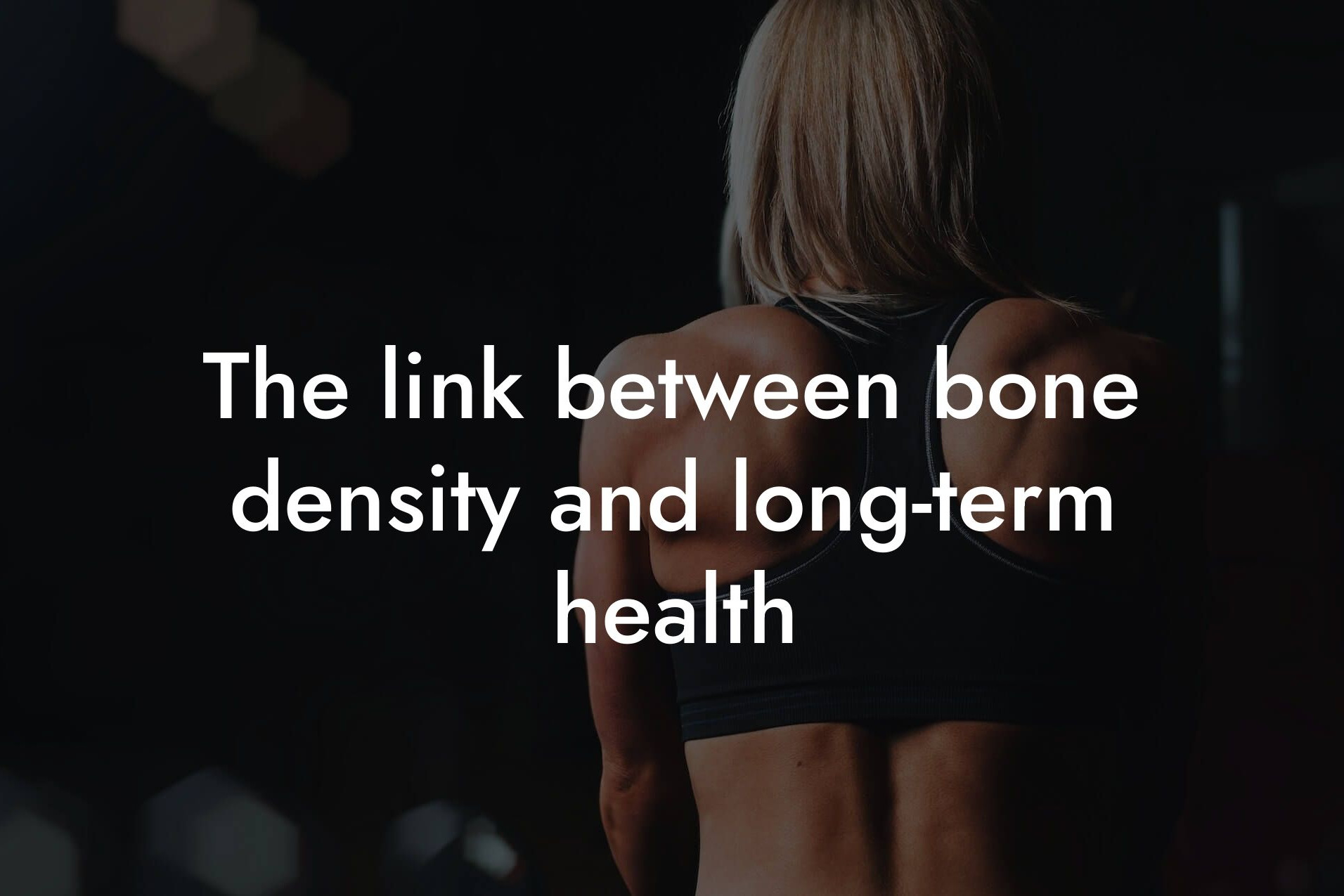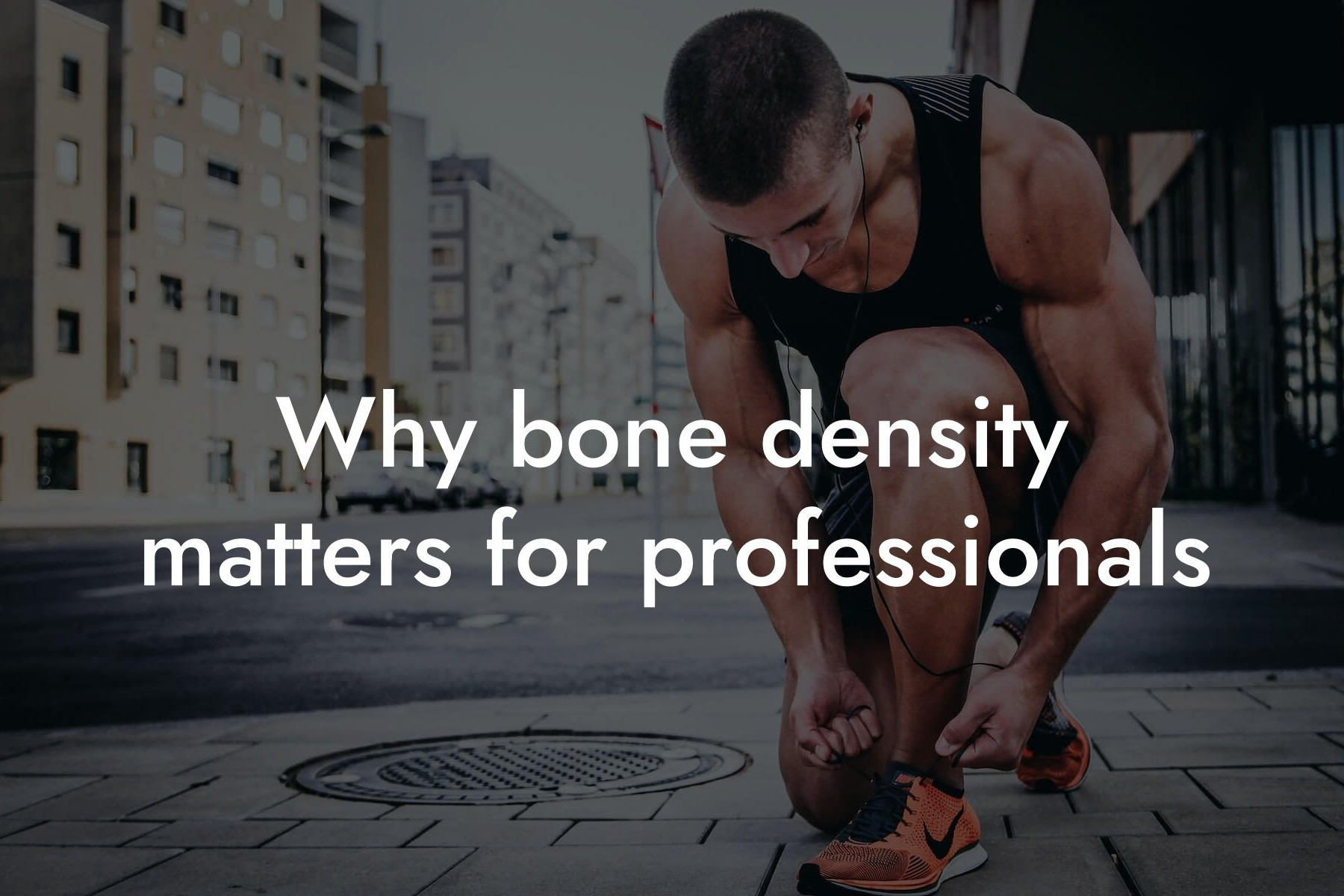As high-earning professionals, you understand the importance of maintaining a healthy physique and overall well-being. At Tano Performance Group, we believe that strong bones are the foundation of a healthy body. That's why we're dedicated to providing you with the knowledge and tools you need to optimize your bone health. In this article, we'll dive into the essential nutrition tips for stronger bones, so you can take your physical performance to the next level.
Table of Contents
Understanding Bone Health
Bone health is a critical aspect of overall health, and it's often overlooked until problems arise. As we age, our bone density naturally decreases, making us more susceptible to osteoporosis, fractures, and other bone-related issues. However, with the right nutrition and lifestyle habits, you can maintain strong bones and reduce the risk of these problems.
At Tano Performance Group, we use DEXA scans to provide our clients with a comprehensive body assessment, including bone density measurements. This information empowers you to make informed decisions about your diet and exercise routine, ensuring you're taking the necessary steps to maintain strong bones.
The Importance of Calcium
Calcium is the most abundant mineral in the body, and it's essential for building and maintaining strong bones. Adequate calcium intake is crucial, especially during childhood and adolescence, as it sets the stage for peak bone mass. Even as adults, calcium continues to play a vital role in maintaining bone density.
The recommended daily intake of calcium varies by age, but most adults need around 1,000-1,200 mg per day. You can get calcium through a combination of diet and supplements. Foods rich in calcium include dairy products, leafy greens, and fortified plant-based milk.
Vitamin D: The Sunshine Vitamin
Vitamin D is another critical nutrient for bone health. It helps the body absorb calcium and maintain strong bones. Vitamin D deficiency is common, especially in people who live in areas with limited sunlight, have darker skin, or use sunscreen regularly.
The best way to get vitamin D is through sun exposure, but you can also consume it through fatty fish, fortified dairy products, and supplements. Aim for 600-800 IU of vitamin D per day, and consider consulting with a healthcare professional to determine the right dosage for your needs.
Other Essential Nutrients for Bone Health
While calcium and vitamin D are the most well-known nutrients for bone health, other essential vitamins and minerals play a crucial role in maintaining strong bones. These include:
- Vitamin K: Found in leafy greens, vitamin K helps regulate calcium metabolism and promotes bone health.
- Magnesium: This mineral is involved in bone mineralization and density. Include magnesium-rich foods like dark leafy greens, nuts, and seeds in your diet.
- Phosphorus: Phosphorus is another mineral that's essential for bone health. You can find it in protein-rich foods like meat, fish, and eggs.
- Omega-3 fatty acids: These healthy fats, found in fatty fish and nuts, help reduce inflammation, which can contribute to bone loss.
Foods That Promote Bone Health
Incorporating bone-healthy foods into your diet can make a significant difference in your overall bone health. Some of the best foods for strong bones include:
- Fatty fish like salmon and sardines (rich in vitamin D and omega-3 fatty acids)
- Dairy products like milk, cheese, and yogurt (rich in calcium and vitamin D)
- Leafy greens like kale, spinach, and broccoli (rich in calcium, vitamin K, and magnesium)
- Nuts and seeds like almonds, sesame seeds, and chia seeds (rich in magnesium and phosphorus)
- Fortified plant-based milk and cereals (rich in calcium and vitamin D)
Foods That Can Harm Bone Health
While some foods can promote bone health, others can have a negative impact. Be mindful of the following foods that can harm your bones:
- Soda and sugary drinks (high in phosphoric acid, which can leach calcium from bones)
- Salted and processed foods (high in sodium, which can increase calcium excretion)
- Caffeine and alcohol (can interfere with calcium absorption and bone health)
- High-oxalate foods like spinach, beets, and rhubarb (can inhibit calcium absorption)
Lifestyle Habits for Stronger Bones
Nutrition is just one aspect of maintaining strong bones. Other lifestyle habits can also play a significant role in promoting bone health:
- Regular exercise: Weight-bearing exercises like running, jumping, and weightlifting can help strengthen bones.
- Get enough sleep: Aim for 7-9 hours of sleep per night to help regulate hormones and support bone health.
- Manage stress: Chronic stress can lead to inflammation, which can contribute to bone loss. Engage in stress-reducing activities like meditation and yoga.
- Don't smoke: Smoking is a significant risk factor for osteoporosis and bone fractures.
Maintaining strong bones is crucial for overall health and well-being. By incorporating the nutrition tips and lifestyle habits outlined in this article, you can take control of your bone health and reduce the risk of osteoporosis, fractures, and other bone-related issues. At Tano Performance Group, we're committed to helping high-earning professionals like you achieve their physical goals and maintain optimal health. Schedule a DEXA scan today and take the first step towards stronger bones and a healthier you.
Frequently Asked Questions
What are the most important nutrients for bone health?
Calcium and vitamin D are the most crucial nutrients for maintaining strong bones. Calcium helps build and maintain bone density, while vitamin D enables the body to absorb calcium effectively. Other essential nutrients for bone health include vitamin K, magnesium, and phosphorus.
How much calcium do I need daily for strong bones?
The recommended daily intake of calcium varies by age. For adults under 50, the recommended daily intake is 1,000 mg, while for adults over 50, it's 1,200 mg. You can get calcium through dairy products, leafy greens, and fortified foods, or consider supplements if necessary.
What are the best food sources of calcium?
Some of the richest food sources of calcium include dairy products like milk, cheese, and yogurt, as well as leafy greens like kale, broccoli, and spinach. Fortified foods like cereals and orange juice can also provide a significant amount of calcium.
Can I get enough vitamin D through sun exposure alone?
While some vitamin D can be produced through sun exposure, it's often not enough to meet daily needs, especially during winter months or for people with limited sun exposure. Supplementing with vitamin D or consuming vitamin D-rich foods like fatty fish, egg yolks, and fortified dairy products can help ensure adequate levels.
What role does exercise play in maintaining strong bones?
Regular exercise, especially weight-bearing and resistance training, can help build and maintain strong bones by stimulating bone growth and density. This is especially important for older adults, as it can help prevent osteoporosis and fractures.
How does body fat percentage affect bone density?
Maintaining a healthy body fat percentage is essential for bone health. Excess body fat can lead to increased inflammation, which can negatively impact bone density. On the other hand, being underweight can also compromise bone health. Aim for a healthy body fat percentage through a balanced diet and regular exercise.
What is osteoporosis, and how can I prevent it?
Osteoporosis is a condition characterized by brittle and porous bones, increasing the risk of fractures. You can prevent osteoporosis by maintaining a healthy diet rich in calcium and vitamin D, exercising regularly, and avoiding smoking and excessive alcohol consumption.
Can I improve my bone density at any age?
While peak bone density is typically reached in early adulthood, it's never too late to take steps to improve bone health. Even small changes to your diet and exercise routine can make a significant difference in maintaining strong bones as you age.
How does menopause affect bone health?
Menopause can lead to a decline in estrogen levels, which can negatively impact bone density. However, with a healthy diet, regular exercise, and potentially hormone replacement therapy, women can mitigate the effects of menopause on bone health.
What are the risks of low bone density?
Low bone density can increase the risk of osteoporosis, fractures, and osteopenia. It can also lead to chronic pain, limited mobility, and a decreased quality of life.
How can I monitor my bone density?
You can monitor your bone density through regular DEXA (dual-energy X-ray absorptiometry) scans, which measure bone mineral density. Your healthcare provider may recommend these scans based on your individual risk factors and health history.
What are the best exercises for building strong bones?
Weight-bearing exercises like running, jumping, and hiking can help build strong bones, as can resistance training exercises like squats, lunges, and deadlifts. High-impact exercises like aerobics and dance can also be beneficial.
Can I take supplements to support bone health?
Yes, supplements like calcium, vitamin D, and omega-3 fatty acids can support bone health. However, always consult with your healthcare provider before adding any supplements to your routine, as they may interact with medications or have adverse effects in certain individuals.
How does smoking affect bone health?
Smoking can significantly compromise bone health by reducing bone density, increasing the risk of osteoporosis, and impairing fracture healing. Quitting smoking can greatly benefit bone health.
What is the relationship between bone health and overall health?
Bone health is closely linked to overall health, as it can affect mobility, balance, and quality of life. Maintaining strong bones can also reduce the risk of chronic diseases like osteoporosis, diabetes, and heart disease.
Can I improve my bone health through stress management?
Yes, managing stress through techniques like meditation, yoga, and deep breathing can help improve bone health. Chronic stress can lead to increased cortisol levels, which can negatively impact bone density.
How does sleep affect bone health?
Adequate sleep is essential for bone health, as it allows the body to repair and regenerate bone tissue. Aim for 7-9 hours of sleep per night to support bone health.
What role does genetics play in bone health?
Genetics can play a role in bone health, as certain genetic factors can increase the risk of osteoporosis and fractures. However, a healthy lifestyle and diet can help mitigate the effects of genetic predisposition.
Can I improve my bone health through diet alone?
While diet plays a crucial role in bone health, it's unlikely to improve bone health through diet alone. A combination of a healthy diet, regular exercise, and stress management is typically necessary to support strong bones.
How does age affect bone health?
Bone density typically peaks in early adulthood and declines with age. However, with a healthy lifestyle and diet, it's possible to maintain strong bones well into older age.
What are the benefits of consulting with a healthcare professional about bone health?
Consulting with a healthcare professional can help you identify risk factors for osteoporosis and fractures, develop a personalized plan to improve bone health, and monitor progress through regular DEXA scans and other tests.
Can I improve my bone health if I have a medical condition?
Yes, even with a medical condition, it's possible to improve bone health through a combination of diet, exercise, and stress management. Consult with your healthcare provider to develop a personalized plan that takes into account your specific condition.
How does bone health affect athletic performance?
Maintaining strong bones is essential for athletic performance, as it can improve power, speed, and agility. Strong bones can also reduce the risk of injuries and improve overall athletic longevity.
Here are some related articles you might love...
- The link between bone density and long-term health
- Why bone density matters for professionals
- Bone density and aging: What professionals need to consider
- How to improve bone density naturally
- Understanding osteoporosis and its risks
- DEXA scan for bone density: What you need to know
- The role of calcium and vitamin D in bone health
- Best exercises for increasing bone density
- How stress affects bone density
Zak Faulkner
Zak Faulkner is a leading authority in the realm of physical health and body composition analysis, with over 15 years of experience helping professionals optimise their fitness and well-being. As one the experts behind Tano Performance Group, Zak has dedicated his career to providing in-depth, science-backed insights that empower clients to elevate their physical performance and overall health.
With extensive knowledge of DEXA technology, Zak specializes in delivering comprehensive body assessments that offer precise data on body fat, muscle mass, bone density, and overall physique. His expertise enables individuals to make informed decisions and achieve their fitness goals with accuracy and confidence. Zak’s approach is rooted in a deep understanding of human physiology, combined with a passion for helping clients unlock their full potential through personalised strategies.
Over the years, Zak has earned a reputation for his commitment to excellence, precision, and client-focused service. His guidance is trusted by top professionals who demand the best when it comes to their health. Whether advising on fitness programs, nutritional strategies, or long-term wellness plans, Zak Faulkner’s insights are a valuable resource for anyone serious about taking their health and fitness to the next level.
At Tano Performance Group, Zak continues to lead our Content Team revolutionising how professionals approach their physical health, offering unparalleled expertise that drives real results.




